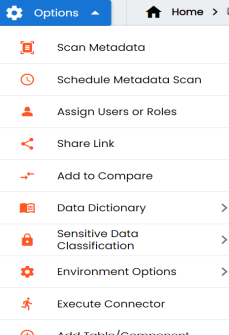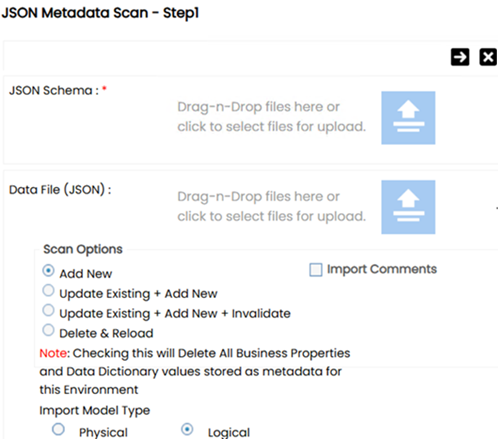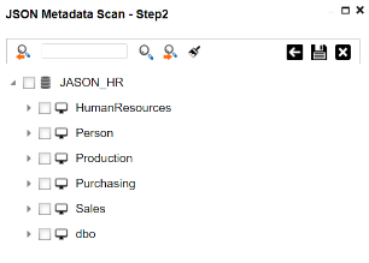You can import metadata from JSON files into a JSON environment.
To import metadata from JSON files, follow these steps:
- On the Explore tab, click a JSON environment tile to view its details.
Alternatively, in the Data Catalog pane, select the JSON option to view all JSON environments. - Click Options.
The available options appear.
- Click Scan Metadata.
- Under the JSON Schema section, drag and drop or use
 to browse and select the JSON schema file.
to browse and select the JSON schema file. - Under the Data File [JSON] section, drag and drop or use
 to browse and select the JSON data file.
to browse and select the JSON data file. - Use the following scan options:
- Add New
- Use this option to insert new metadata into the environment.
- Update Existing + Add New
- Use this option to update the existing metadata based on tables and columns in the JSON file.
- Update Existing + Add New + Invalidate
- Use this option to update the existing metadata without deleting it.
- Delete & Reload
- Use this option to delete all the business properties and data dictionary stored as metadata for this environment.
- Import Comments
- Use this option to import comments and descriptions defined in the JSON file.
- Skip Empty Cells
- Use this option to skip blank cells in the JSON file from overwriting existing values. This option is available only when you select the Update Existing + Add New or Update Existing + Add New + Invalidate option.
- Import User Defined Fields
- Use this option to import environment-specific custom fields configured as User Defined Fields (UDFs). This option is available only when you select the Update Existing + Add New or Update Existing + Add New + Invalidate option.
- Click the appropriate Import Model Type.
- Click
 .
. - Select the required schema and tables.
- Click
 .
.
The JSON Metadata Scan - Step1 page appears.

The JSON Metadata Scan - Step2 page appears.

The metadata is imported and saved in the environment.
|
Copyright © 2026 Quest Software Inc. |